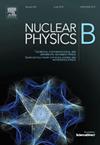Probing Planck scale effects on absolute mass limit in neutrino flavor evolution
IF 2.8
3区 物理与天体物理
Q2 PHYSICS, PARTICLES & FIELDS
引用次数: 0
Abstract
This work explores how the generalized uncertainty principle, a theoretical modification of the Heisenberg uncertainty principle inspired by quantum gravity, affects neutrino flavor oscillations. By extending the standard two-flavor neutrino model, we show that the oscillation probability acquires an additional phase term that depends on the square roots of the individual neutrino masses, introducing new features beyond the conventional mass-squared differences. To account for the non-Hermitian nature of the resulting dynamics, we employ parity-time () symmetric quantum mechanics, which allows for consistent descriptions of systems with balanced gain and loss mechanisms. We analyze the feasibility of observing these effects in current and future neutrino experiments, such as DUNE, JUNO, IceCube, ORCA–KM3NeT, MINOS, Daya Bay, Hyper-Kamiokande, and KATRIN, and find that the predicted modifications could fall within the sensitivity of current experiments. Moreover, we propose that analog quantum simulation platforms, such as cold atoms, trapped ions, and photonic systems, offer a promising route to test these predictions under controlled conditions. Our findings suggest that neutrino oscillations may serve as an effective probe of quantum gravity effects, providing a novel connection between fundamental theory and experimental observables.
探测中微子味演化中普朗克尺度对绝对质量极限的影响
这项工作探讨了广义不确定性原理(由量子引力启发的海森堡不确定性原理的理论修正)如何影响中微子风味振荡。通过扩展标准双味中微子模型,我们发现振荡概率获得了一个额外的相位项,该相位项取决于单个中微子质量的平方根,引入了传统质量平方差之外的新特征。为了解释结果动力学的非厄米性质,我们采用了宇称时间(PT)对称量子力学,它允许对具有平衡增益和损失机制的系统进行一致的描述。我们分析了在DUNE、JUNO、IceCube、ORCA-KM3NeT、MINOS、Daya Bay、Hyper-Kamiokande和KATRIN等当前和未来的中微子实验中观测这些效应的可行性,发现预测的变化可以在当前实验的灵敏度范围内。此外,我们提出模拟量子模拟平台,如冷原子,捕获离子和光子系统,提供了在受控条件下测试这些预测的有希望的途径。我们的发现表明,中微子振荡可以作为量子引力效应的有效探测,在基础理论和实验观测之间提供了一种新的联系。
本文章由计算机程序翻译,如有差异,请以英文原文为准。
求助全文
约1分钟内获得全文
求助全文
来源期刊

Nuclear Physics B
物理-物理:粒子与场物理
CiteScore
5.50
自引率
7.10%
发文量
302
审稿时长
1 months
期刊介绍:
Nuclear Physics B focuses on the domain of high energy physics, quantum field theory, statistical systems, and mathematical physics, and includes four main sections: high energy physics - phenomenology, high energy physics - theory, high energy physics - experiment, and quantum field theory, statistical systems, and mathematical physics. The emphasis is on original research papers (Frontiers Articles or Full Length Articles), but Review Articles are also welcome.
 求助内容:
求助内容: 应助结果提醒方式:
应助结果提醒方式:


